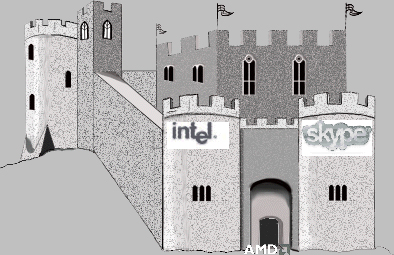Intel the monopolist- Skype the enabler?


Last week in my post entitled Why is Skype giving AMD the second-class treatment?, I wrote about an apparently significant advantage Skype is giving Intel chips over rival products for some advanced services.
As just one example, I drew reference to an earlier post where I cited Skype's new 10-participant-capacity conference call feature.
This offering is available only for home and business Skype users with Intel Centrino Duo-powered laptops, and desktop PCs that run Intel Pentium D processors, Pentium Extreme Edition proceesors and the new Intel Viiv technology. All others, such as AMD users, only get five-particpant sessions.
Now, my colleague Tom Krazit has delved into this matter head-on. The more I think about it, I find it hard to think of this as just a smart deal. It sounds rather monopolistic to me.
"It's the latest, and certainly most prominent, example of Intel's new take on marketing: Lock in software partners as well as the PC makers," Tom writes in his piece, Intel's mantra: let's make a deal.
Tom tells us to "expect more of these exclusive pacts as Intel takes a brass-knuckles approach to its long-running feud with AMD, particularly as Intel's Viiv platform strategy of bundling home-entertainment software with its chips shifts into high gear over the next few months."
But from a read of Tom's analysis, these brass knuckles of Intel's seem to be backed up by an iron fist- an iron fist aimed right at AMD's you don't want to know where.
"In the process, moves like the Skype deal, which will run for a limited but undisclosed period of time, are a way to block AMD from landing customers who want to use applications such as Skype's 10-user conferencing," Tom writes, adding that AMD charged in a 2005 antitrust compliant that Intel uses its marketing programs in a selective manner to punish companies who have used AMD's chips, or to reward companies like Dell who have cut exclusive deals with Intel.
Intel denies these claims- but there is something afoot here that doesn't pass my sniff test. Nor, for that matter, the sniff test of my colleague George Ou, an advanced networking and server architecture expert whose expertise I instinctively defer to in these matters.
On Monday after Tom posted his piece, George sent an email to some of his colleagues who he correctly assumed would have an interest in these matters. I am one of those colleagues he sent the email to.
George writes:
It's exactly what my point was when the Skype rep told me that they were looking up the CPU ID. Skype went out of their way to look up the CPU ID and specifically kill all AMD and single core Intel processors even though they are fully capable of running 10-user conference mode in Skype with performance to spare. Deliberately disabling CPUs in this manner sets a dangerous precedent. Intel could effectively do this with every new application and put their processors on the fast track even if it had inferior performance numbers and they could financially afford to do this.
But since Skype is free, the situation is very tricky. If they had marketed this as a free 10-user license when you buy the Intel dual-core processor, then it wouldn't be so sticky.
Well, the term "monopolist" is a legal expression best left to lawyers and the judiciary. But is this a "dangerous precedent?" Absolutely.
If I am AMD I am checking with legal to see exactly how dangerous.